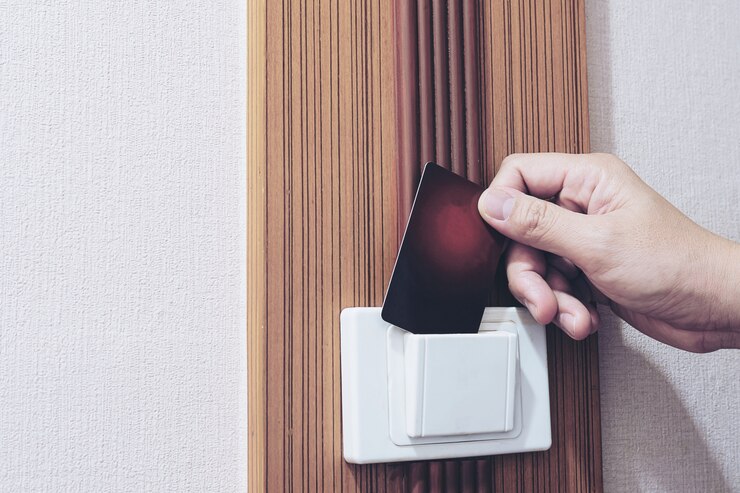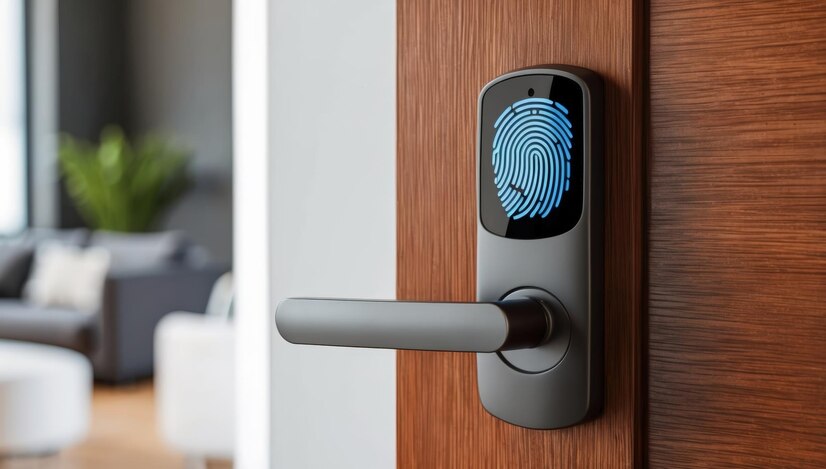Biometric home security systems use unique physical characteristics like fingerprints or facial recognition for access control. These advanced systems offer a high level of security for homes, ensuring only authorized individuals can enter.
The use of biometric technology provides a seamless and convenient way to protect your home, eliminating the need to carry keys or remember codes. With the increasing concerns over home security, biometric systems have become popular due to their accuracy and reliability.
We will explore the benefits and features of biometric home security systems, helping you make an informed decision to safeguard your home and loved ones.

Understanding Biometric Technology
Evolution Of Home Security
Home security has come a long way from traditional lock and key systems to high-tech solutions. With advancements in technology, the evolution of home security has led to the development of biometric systems that offer unparalleled security and convenience.
Basics Of Biometric Authentication
Biometric authentication is a method of verifying a person’s identity based on unique physical or behavioral characteristics. Unlike traditional keys or passwords, biometric authentication uses iris scans, fingerprints, facial recognition, or voice recognition to grant access. This cutting-edge technology ensures that only authorized individuals can enter a premises, significantly enhancing home security.
Advantages Of Biometric Home Security
Biometric home security systems offer advanced protection by using unique physical traits for access control, such as fingerprints, voice recognition, or facial scans. This ensures heightened security and eliminates the need for traditional keys or codes, providing a convenient and reliable way to enhance home safety and peace of mind.
Unparalleled Security
Biometric home security systems offer unparalleled security for homeowners. The use of unique biological traits such as fingerprints, iris scans, or facial recognition ensures that only authorized individuals can access the home. This high level of security greatly reduces the risk of unauthorized entry, making biometric systems an effective deterrent against burglaries and unauthorized access.
User Convenience
One of the key advantages of biometric home security systems is the unparalleled convenience they offer to the homeowners. With biometric technology, there is no need to carry keys or remember passwords. Users can simply use their unique biological traits to gain access to their homes, eliminating the risk of losing keys or having passwords compromised. This seamless and intuitive authentication process enhances user experience and provides a hassle-free way to secure the home.
Integration With Smart Homes
Biometric home security systems seamlessly integrate with smart home technology, providing homeowners with a comprehensive security solution. These systems can be integrated with other smart home devices such as security cameras, alarms, and automation systems, allowing for centralized control and monitoring. This integration ensures that homeowners can manage their security systems efficiently and enjoy the benefits of a fully connected and secure living environment.
Types Of Biometric Home Security Systems
Biometric home security systems offer advanced and convenient ways to keep homes secure, utilizing unique physical characteristics to grant access. These systems provide enhanced safety over traditional methods and offer various options to suit individual preferences and needs.
Fingerprint Recognition
Fingerprint recognition is one of the most commonly used biometric security measures. These systems authenticate individuals based on their unique fingerprints. When integrated into home security systems, these biometric scanners offer fast and reliable access control, ensuring that only authorized individuals are granted entry.
Facial Recognition
Facial recognition technology has gained popularity in recent years, offering a seamless and non-intrusive way to secure homes. By scanning and analyzing the unique facial features of individuals, these systems provide a high level of security and convenience. Integrated facial recognition systems can easily identify authorized individuals, allowing for effortless access.
Retinal Scan
Retinal scan technology offers an extremely secure form of biometric authentication. By examining the patterns of blood vessels in the retina, these systems provide a highly accurate and reliable method of access control. Integration of retinal scan technology in home security systems ensures unparalleled security, making it difficult for unauthorized individuals to gain entry.
Selecting The Right Biometric System For Your Home
When it comes to safeguarding your home, biometric home security systems are a reliable and advanced option to consider. Unlike traditional security systems that rely on keypads or keys, biometric systems offer a higher level of security by utilizing unique biological features such as fingerprints, facial recognition, or iris scans. Selecting the right biometric system for your home is crucial for ensuring the safety and protection of your family and property.
Factors To Consider
When selecting a biometric home security system, there are several important factors to consider to ensure you choose the right one for your specific needs:
- Biometric Recognition Method: Determine which biometric recognition method aligns best with your preferences and the level of security you require. Fingerprint, facial, and iris recognition are the most common options available.
- Scalability: Consider the scalability of the system to accommodate the size of your home and the number of individuals requiring access. Ensure the system can easily expand if needed.
- Integration: Verify whether the biometric system can seamlessly integrate with other home automation technologies or security systems already in place.
- Reliability and Accuracy: Look for a system with high reliability and accuracy to minimize false readings and ensure consistent performance.
- User-Friendly Interface: Choose a system with an intuitive and user-friendly interface to simplify the process of adding and managing authorized users.
- Backup Options: Assess the availability of backup options such as key codes or physical keys in case of technical malfunctions or emergencies.
Best Practices For Installation
Proper installation of the biometric home security system is essential to maximize its effectiveness and reliability. Here are some best practices to consider:
- Professional Installation: Opt for professional installation to ensure that the system is set up accurately and securely.
- Strategic Placement: Strategically place the biometric devices at entry points and areas with high traffic to ensure convenient and efficient access control.
- Regular Maintenance: Schedule regular maintenance and checks to keep the system functioning optimally and address any potential issues promptly.
- Secure Connectivity: Ensure that the system is securely connected to your home network and consider investing in additional security measures such as encryption.
Future Of Biometric Home Security
Biometric home security systems have seen rapid advancements in technology, paving the way for the future of home security. The integration of biometrics, such as fingerprint and facial recognition, enhances security measures, offering homeowners a more convenient and reliable way to protect their properties. As technology continues to evolve, the future of biometric home security is poised to revolutionize the way we safeguard our homes.
Advancements In Technology
Advancements in technology have played a pivotal role in the evolution of biometric home security systems. With the introduction of artificial intelligence (AI) and machine learning, biometric recognition has become more accurate and efficient. Cutting-edge sensor technologies have enabled the development of multifaceted biometric systems, capable of identifying individuals with unparalleled precision.
The integration of cloud-based storage and connectivity has also enhanced the functionality of biometric home security systems. This enables seamless remote access and real-time monitoring, empowering homeowners to keep a vigilant eye on their properties from anywhere in the world.
Moreover, the emergence of smart home technology has led to the convergence of biometric security with other home automation features. Integration with voice assistants and smart locks has elevated the level of convenience and control that biometric systems offer, making them an integral part of the connected home ecosystem.
Potential Challenges And Solutions
While biometric home security systems present numerous benefits, they are not without potential challenges. One significant concern is the risk of biometric data breaches, which could compromise the security and privacy of homeowners. To mitigate this risk, encryption and secure data storage protocols are being continuously refined to safeguard biometric information.
Another challenge is the potential for false positives or negatives in biometric recognition. To address this, ongoing research is focused on improving the robustness and accuracy of biometric algorithms. Additionally, the development of multimodal biometrics, which combines multiple biometric identifiers, offers a more resilient and adaptable security solution.
Furthermore, interoperability and standardization within the biometric security industry pose challenges for seamless integration with diverse home security systems. Efforts to establish industry standards and protocols are underway to ensure that biometric security systems can interoperate with various smart home devices and platforms.
Frequently Asked Questions Of Biometric Home Security Systems
What Is The Most Secure Biometric Security?
Fingerprint recognition is considered the most secure biometric security due to its accuracy and uniqueness. It is difficult to replicate and offers strong protection for sensitive information and assets.
What Are Three Types Of Biometric Security Devices?
The three types of biometric security devices are fingerprint scanners, facial recognition systems, and iris scanners. These devices use unique physical characteristics for authentication and access control.
What Is The Best Biometric System?
The best biometric system depends on specific needs and requirements. Options include fingerprint, facial recognition, and iris scanning. Each has pros and cons related to accuracy, cost, and usability. It’s essential to evaluate the specific use case to determine the most suitable biometric system.
What Are The Disadvantages Of Biometric Devices?
Disadvantages of biometric devices include potential privacy concerns, risk of hacking, and high implementation costs. In addition, biometric data may not be completely accurate and can lead to false rejections.
Conclusion
Biometric home security systems offer advanced protection for your family and assets. With their smart technology and seamless integration, they provide peace of mind and convenience. As the demand for home security continues to grow, biometric systems are proving to be highly effective in safeguarding homes.
Embrace the future of home security with biometric systems.

